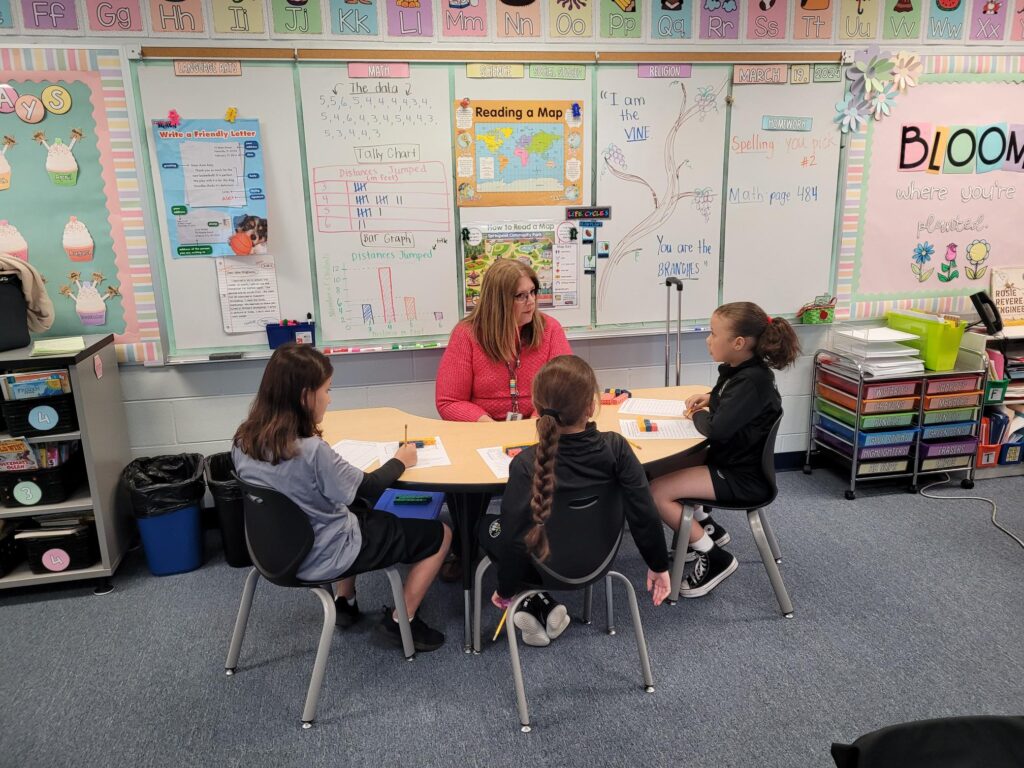
Amy Galloway provides targeted math support to three students as part of Holy Family Catholic School's D.E.N.S. program. D.E.N.S. stands for Differentiation, Enrichment and Needed Support.
JACKSONVILLE, Florida - Math class at Holy Family Catholic School begins with two polls, one in which students share their snack preferences and the other in which they name their favorite animals.
Second-grade teacher Alicia Revels divides the room into two groups of students and assigns each a survey to give the class. The two groups count the votes.
Revels writes the results on the whiteboard. In the snack poll, cookies edged out popcorn six to five, while only one student chose chips. In the animal group, tigers received the most love with six votes. Monkeys got four, while two students preferred elephants.
Revels’ goal when she designed the lesson: teach students how to display and interpret data. “I love it when students can have input when it comes to data, so it makes it more relevant to them,” she said.
After the fun, Revels asks the students to design a bar graph for their poll results and create related equations.
As the students begin work, three girls who were in the animals group break away and head to a small table at the right side of the classroom. Amy Galloway hands each student two worksheets and connecting blocks in red, blue and yellow.
“What do you put first in a bar graph?” Galloway asks. After creating the graph with the blocks, they draw and color it with markers on a graph sheet. They then fill in the numbers 0 through 10 in the left column and the names of each animal in the columns along the bottom row.
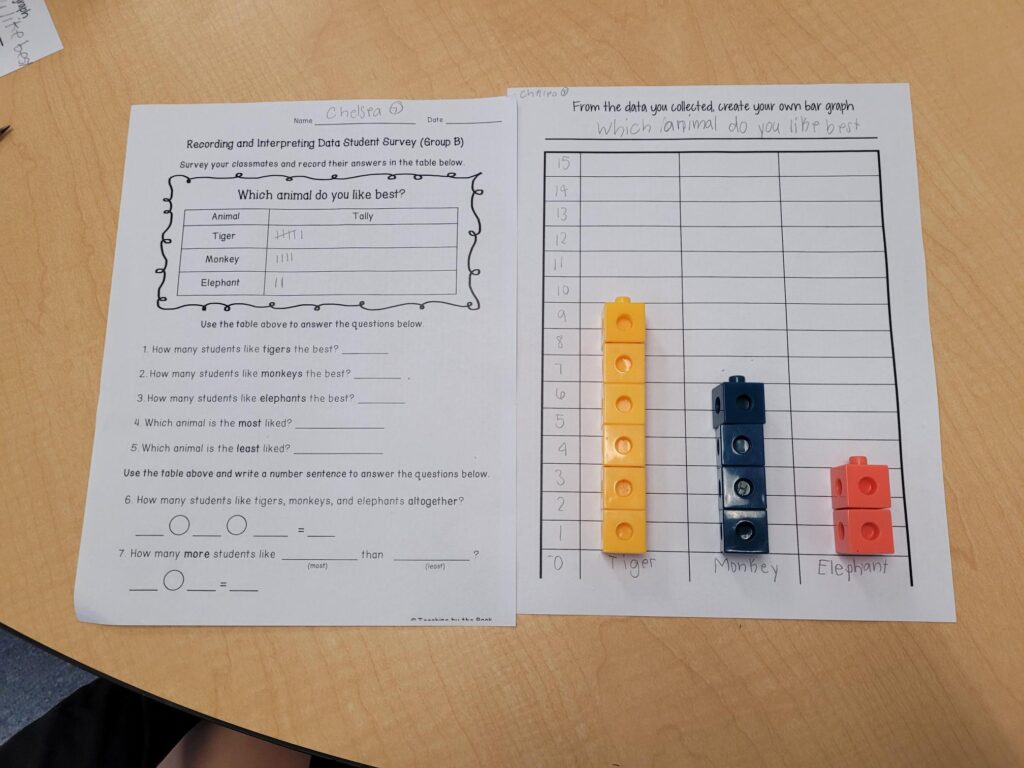
After a math lesson, D.E.N.S. students use these colored blocks to create bar graphs to help them interpret data.
Though the casual observer might not notice, the three students are receiving stealth tutoring. It’s one example of Holy Family’s Differentiation, Enrichment and Needed Support or D.E.N.S. program in action.
It's also another example of how Florida Catholic schools are increasingly trying new approaches to better meet the needs of more diverse students and fuel their growth in the Sunshine State.
“D.E.N.S started as a way to give teachers additional support and create smaller groups in the class to meet student needs,” explained assistant principal Amanda Robison.
The program also includes enrichment for students identified as high achievers to dig deep into non-academic subjects, including religious education. Down the hall from Revels’ class, a small group of third graders in the enrichment program makes small tombs with paper plates and pebbles to expand the lessons taught during the Christian holy week. About 30 to 40 students participate in the enrichment component. A third part of the program, led by the school guidance counselor, offers help dealing with life events and is open to all the K-8 school’s 408 students.
Robison, who joined the staff in August as part of a new administrative team, worked to revitalize the program, which had been scaled back during the pandemic.
Her background in special education and educational leadership helped her transform the program to zero in on specific learning needs and support students who needed targeted help.
The staff started analyzing test scores to see which students were below grade level in certain areas, for example, phonics or math.
The students take the Renaissance Star reading and math assessment for progress monitoring quarterly throughout the school year. This is used for determining which students may need intervention or enrichment. Educators use the results to determine which students have mastered a specific skill on the Florida math standards, such as "Add or subtract multi-digit numbers including using a standard algorithm with procedural fluency."
Those who have fallen behind are assigned to D.E.N.S. for extra help to get them back on track in those specific areas. Students who are in D.E.N.S. take the assessments every six to eight weeks to measure progress and determine whether intervention is still necessary.
The school also uses iXL, a website that delivers personalized learning and diagnostic tests, to verify Star scores and help ensure students get the intervention that best meets their needs. Teachers also use iXL lessons as practice exercises following an in-class lesson.
One advantage of D.E.N.S. is that it infuses differentiated support and enrichment into the school day, so families’ before or after-school schedules are not disrupted. The learning support teachers “push in” to the regular classroom and work with the smaller group at the same time their classmates are learning the same lesson. It also makes receiving extra support seem routine and discourages labeling.
Sessions last for six to eight weeks, and students leave D.E.N.S. when the data show they have mastered the targeted skills. For those who require additional help, temporary pullout programs and one-on-one instruction are also provided.
“It’s really beautiful because the students aren’t having to live in this intervention world,” Robison said. “They are visiting it.”
School data shows the program is working. Of those receiving help in reading, 93% have made progress, and 85% percent getting help have progressed in math. Robison said the program had delivered 100 services in the prior week, though not necessarily to 100 students as some receive multiple services.
The program also benefits more than just those students receiving help by allowing teachers to instruct a diverse group of students while allowing those who don’t need extra support to move forward.
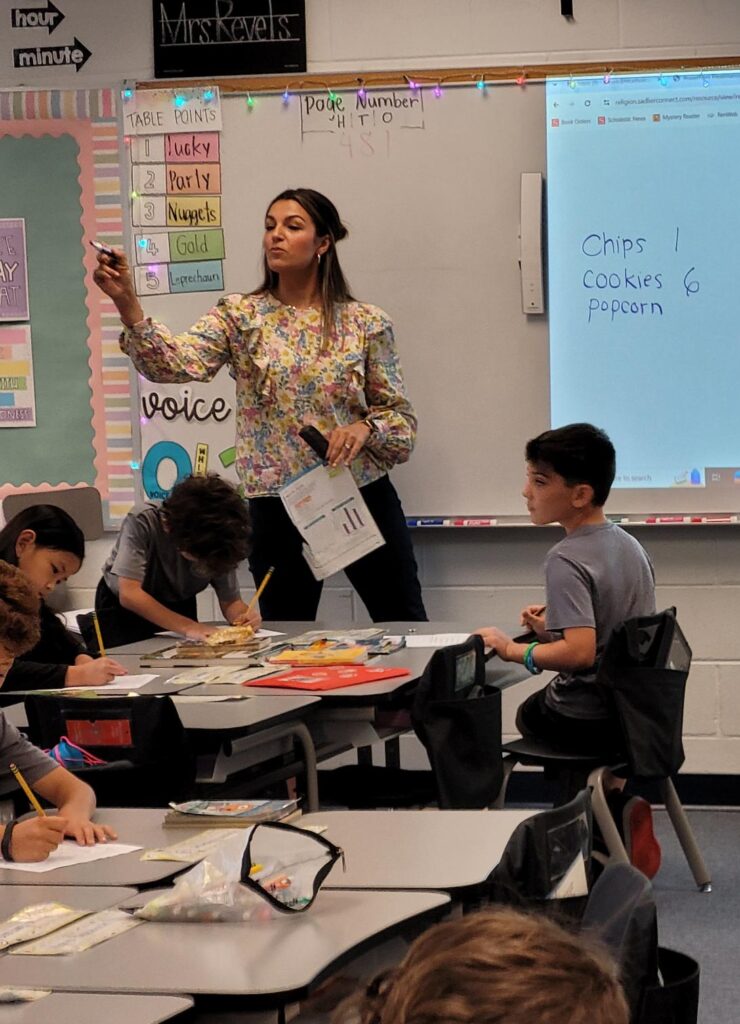
D.E.N.S. allows classroom teachers like Alicia Revels to educate a diverse group of students by offering support to those who need it so she can continue to focus on the rest of the class.
“When my team goes in and works with this targeted group, it gives the teachers in the class the ability to really focus on what the other students need,” Robison said. “It’s really meant to keep the pace of the class instruction continuous and high-achieving and make sure education is getting scaffolded along the way to ensure nobody is left behind.”
After the three D.E.N.S. students finish their math graphs, they grab their electronic tablets and seamlessly rejoin the rest of the class, where all the students are taking their diagnostic tests to measure their skills. An algorithm targets areas are each student needs more practice. It also acts as a D.E.N.S. screener. If some areas stand out as off track, teachers can offer extra practice and do further testing to see if they could benefit from D.E.N.S.
“We can swoop in,” Robison said. “It’s designed in a way to take the stress off the teachers and not have them have to differentiate among several grade levels in their instruction.”
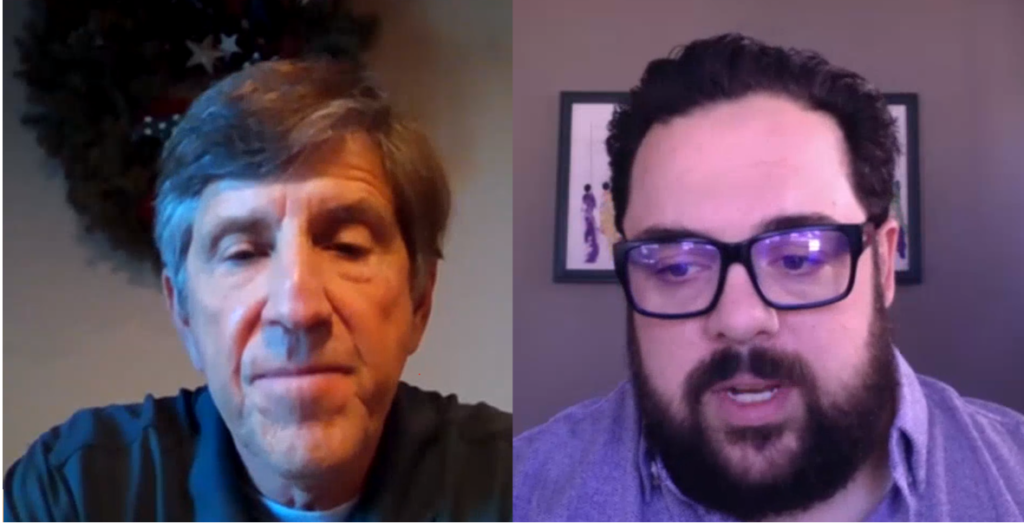 On this episode, Tuthill speaks with the founder of a Colorado-based organization that works with public and private education organizations to create new opportunities for students to receive education outside the traditional five-days-a-week, 180 days-a-year schooling model.
On this episode, Tuthill speaks with the founder of a Colorado-based organization that works with public and private education organizations to create new opportunities for students to receive education outside the traditional five-days-a-week, 180 days-a-year schooling model.
Tuthill and Parés discuss Colorado laws that allow funding to be portable and how state-sponsored schools can serve students not enrolled full time in district or charter schools. They also discuss the empowerment and business opportunities for teachers and members of local communities to create businesses such as specialized tutoring and learning pods when education funding is portable. Both men believe children are always learning, and that society devalues educational opportunities outside of “traditional” schooling.
"I hope people take the opportunity COVID has provided to reflect on the system that we've had and think about how its reaction only furthered the inequities many of us had already seen and (begin to) wonder how we smooth those inequities out.”
EPISODE DETAILS:
· Parés’ background as a teacher and a disruptor of traditional education models
· Finding state statues that make education funding portable in Colorado and what can be created in other states
· How public-private partnerships can break down false dichotomies about education choice, create win-win solutions and lift all boats
· Small business opportunities for communities and teachers when education funding is portable
· How COVID-19 has reshaped perceptions around traditional schooling and how the experience will shape education’s future
LINKS MENTIONED:
Prenda – The Neighborhood School Reimagined
MyTech High – Personalized, Customized Education
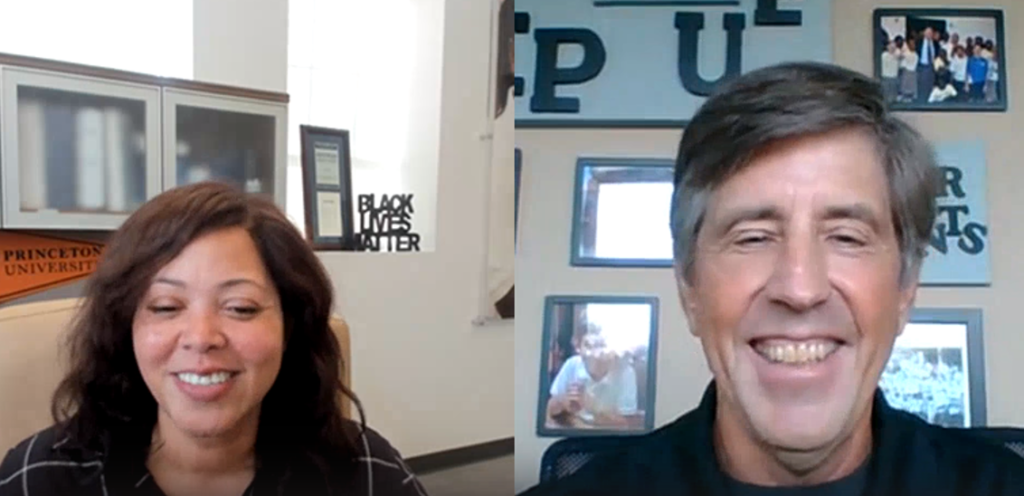 On this episode, Tuthill talks with the leader of a cohort of 16 charter schools in the Washington, D.C., area that primarily educate families of color. The two discuss how Friendship, which serves more than 4,500 students in prekindergarten through 12th grade, has adapted its education delivery in the wake of the global pandemic.
On this episode, Tuthill talks with the leader of a cohort of 16 charter schools in the Washington, D.C., area that primarily educate families of color. The two discuss how Friendship, which serves more than 4,500 students in prekindergarten through 12th grade, has adapted its education delivery in the wake of the global pandemic.
Brantley observes that one of her biggest surprises has been feedback from families of students with special needs who say their children are less distracted, learning more, and getting better personalized feedback from their teachers in digital or hybrid learning environments. She discusses with Tuthill the unbundling of education services to provide families with more flexibility and options, the growing trend of families creating small “pod” schools in their homes, and the necessity of providing internet access to all children to ensure educational equity.
"Adults need to think differently, and they need to catch up with kids … (Families in pods) are getting an amazing education. But that education is owed to all our children regardless of their parents’ resources. We need to figure out how we're going to get it delivered to them."
EPISODE DETAILS:
· What Friendship has learned over the past two semesters of innovation and how it plans to improve for the future
· Creating a robust professional development system for Friendship’s teachers and staff
· Strengths of the digital environment and how technological advancements can personalize education
· The benefits of unbundling education services and the ways entrenched systems may react and adapt
 In a recent interview with Sal Khan, former Florida Gov. Jeb Bush suggested we need a common term for concepts such as mastery-based learning, personalized learning, competency-based learning, individualized learning and customized learning.
In a recent interview with Sal Khan, former Florida Gov. Jeb Bush suggested we need a common term for concepts such as mastery-based learning, personalized learning, competency-based learning, individualized learning and customized learning.
“We need to come up with a name that everyone uses,” Bush told Khan at a recent education reform conference in San Diego. “When you figure it out, send a memo out to the rest of us.”
Governor, I recommend we use the term ”customized education.” Here’s why.
All learning is personal. Thirty students sitting quietly in rows taking detailed notes of their teacher’s lecture are engaged in personalized learning. No two students assimilate the teacher’s words in the same way. We all interpret incoming stimuli through the lenses of our previous experience and knowledge. Since no two people have lived identical lives, no two people interpret information, such as a lecture, in identical ways. Consequently, all learning, including how well someone masters a competency, is personal.
When people use terms such as personalized learning, they are really referring to teaching, not learning. While 30 students sitting in rows taking lecture notes are engaged in personalized learning, the teacher is not engaged in personalized instruction. The teacher is using one-size-fits-all group instruction. This group instruction is what reformers want to replace with instruction that is customized to each child’s needs.
Progressive educators have been advocating for personalized instruction for at least 150 years. Public education adopted one-size-fits-all batch instruction in the late 1800s because it was scalable and personalized instruction was not. Our inability to scale personalized instruction has thwarted us ever since. What’s different today is technology. Technology that did not exist 30 years ago is now enabling entities such as the Khan Academy to make customized education possible for every child globally.
So why do I prefer customized education over personalized instruction?
Khan Academy does not provide personalized instruction for every child. But it does provide content and tools that make it possible for learners to customize their education.
Education is more than instruction. Many of my most powerful learning experiences have come while doing yard work. I listened to a thought-provoking discussion between Sal Khan and Jeb Bush, thought about their exchange while working in the yard, and then clarified my thoughts by writing this blog post. This is why the term you are searching for, Governor, should be broad enough to encompass external instruction and self-guided learning activities. And why I prefer customized education.
So why customized education and not personalized education?
The term personalized learning has become so ubiquitous that trying to explain why it is redundant and misleading seems overly complex and onerous. I’d rather reboot, dump the word “personalized,” and go with customized.
Customized education – the future of public education, workforce education, and civic education.